
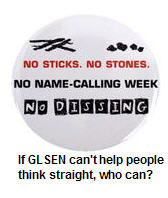 The Gay, Lesbian & Straight Education Network (GLSEN) has declared January 26-30 "No Name-Calling Week." They're trying to call attention to the destructive effects of name-calling and its ugly stepsisters: harassment and bullying. Considering how gay Americans are still subject to open harassment and institutional prejudice all over the country, you can see why GLSEN has a vested interest.
The Gay, Lesbian & Straight Education Network (GLSEN) has declared January 26-30 "No Name-Calling Week." They're trying to call attention to the destructive effects of name-calling and its ugly stepsisters: harassment and bullying. Considering how gay Americans are still subject to open harassment and institutional prejudice all over the country, you can see why GLSEN has a vested interest.
But this effort is also supported by many gay-neutral organizations and groups, including Girl Scouts of America (who once again far surpass the Boy Scouts when it comes to tolerance), the National Education Association, and Big Brothers Big Sisters.
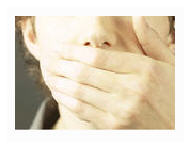
Some will say "No Name-Calling Week" is more accurately called "PC Police Week." After all, an offensive term over the dinner table might be applauded in a rap song. What might be inappropriate to say in your conference room could be perfectly acceptable on the highway after some #%&@ idiot cuts you off. And an escape into Yiddish means instant immunity for many in my extended family.
So where does colorful expression end and insult begin? I support the GLSEN initiative not so much because it muzzles people, but because it inspires debate on where to draw the line and how to model respect. It's important because there's a clear connection between name-calling and bullying, and we've seen what bullying can lead to. On its anti-bullying website, The U.S. Department of Health and Human Services categorizes name-calling as a clear form of bullying. My home state of New Jersey (which knows a thing or two about being teased) also makes the case:
"Though perhaps not as obviously painful as physical bullying, name-calling and teasing can be just as harmful when they result from an "imbalance of power" between the bully and the victim. For example, children's name-calling with terms such as "queer" or "fag" is definitely a form of bias-based bullying."
Over 35 states have taken persistent teasing seriously enough to pass anti-bullying laws. Many state legislatures were inspired by a 2002 U.S. Secret Service report that concluded bullying played a major role in several school shootings. A 2001 National Institute of Child Health and Human Development study found that 30% of students in grades 6-10 reported being bullies, victims, or both.
More recently, according to a report from the National Center for Education Statistics (NCES), in the 2005-2006 school year, 28% of students ages 12-18 reported having been bullied at school during the previous six months. Of these students, 53% said that the bullying had happened once or twice during that period, 25% had experienced bullying once or twice a month, 11% reported having been bullied once or twice a week, and 8% said they had been bullied almost daily.
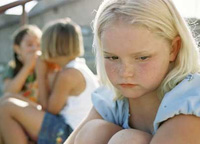
And when you picture bullying in school, don't think Welcome Back, Kotter so much as The Wonder Years. The NCES report revealed that a higher percentage of middle schools than high schools reported daily or weekly occurrences of student bullying and student sexual harassment of other students.
Just last Wednesday, a Long Island, New York 18-year-old was arrested for menacing, beating, and robbing fellow students at his high school. His excuse: "Freshman Friday," a "bullying ritual in which some upperclassmen torment their youngest schoolmates," according to a Newsday report. Even if you dismiss the incident as isolated, how many schools have this lovely "Freshman Friday" tradition? It doesn't exactly sound like an elective. One student-run high school newspaper in Palo Alto, CA calls for an end to it.
Add to this the recent rise of cyber-bullying, a phenomenon that inspires flashy headlines in newsrooms (unless teen girls are sending nude cellphone photos of themselves to classmates. That story seems to top them all.) According to a 2004 survey of 1500 students in grades 4-8 by iSAFE, 42% of kids have been bullied while online. One in four have had it happen more than once. 21% of kids have received mean or threatening e-mail or other messages. 53% of kids admit having said something mean or hurtful to another person online. More than one in three have done it more than once. 58% have not told their parents or an adult about something mean or hurtful that happened to them online.
Clearly, not every term we use to describe people is hurtful. True liberals don't mind being called liberals. Neocons don't mind being called neocons. NASCAR fans don't mind being called NASCAR fans. Most bloggers don't even mind being called bloggers, as belittling as that may be. Here's a tip: check with the person you're tagging before reducing him to two dimensions. (Note to Rev. Joseph Lowery)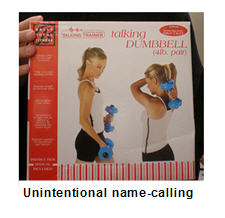
Some parents -- and it's only the parents in this scenario -- see getting bullied as a necessary and beneficial rite of passage -- a skin-thickening, character-building exercise. I suppose the "character" they have in mind is Don Imus.
Others push the ridiculous notion that GLSEN is not out to reduce discrimination, but to promote and advance homosexuality. Message to these people: Relax. Respecting gay people won't make you gay. Nor will watching Brokeback Mountain, "The View," or even VH-1. Meanwhile, watching "American Idol" is considered completely manly. Weird.
While it's too late for many older people (and by that I obviously mean 30 and up) to change their ways, it's not too late for our children, who adopt new phrases and points of view as often as they change ring tones or their underwear. That's why the GLSEN program is targeting schools, educators, and students in particular.
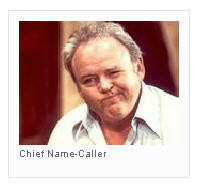
Parents and teachers can play a part by modeling respect over insult, and by promoting and encouraging it in eye- and earshot of others, especially young people. Archie Bunker had his cake (and Edith too), but the rest of us are still on the hook for the messages we send through our behavior.
But we can mix our idealism with realism. In the safety of your own privacy, do as you will. Rev. Lowery should have thought twice before waxing poetic in front of nearly two million people, but the guy in the little red Mazda who zipped in front of me is definitely getting my very un-PC verbal barrage, even if it were "Be Kind to Idiots Week."
(No offense to Idiots.)